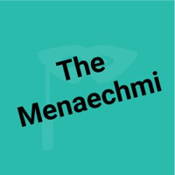
Explore this Show
Overview
Synopsis
Menaechmus Sosicles is on a journey. Accompanied by his faithful servant Messenio, the men have been searching for Menaechmus’ long-lost twin brother, also named Menaechmus. They arrive in Epidamnus, a city with a reputation for cursing its visitors with bad luck. Before long, Menaechmus Sosicles is spoiled with a bountiful lunch, the company of a courtesan, and valuable jewelry. He adores the attention, but is ready to move on and continue his search.
At the same time, the long-lost twin Menaechmus is living in Epidamnus--miserably married, courting the neighborhood courtesan, and suddenly finding himself followed by a new servant (Messenio) who claims to have known him for years. Through a series of confusions, misunderstandings, misidentifications, and a few fits of madness, the brothers finally come face-to-face.
The Menaechmi is perhaps Plautus’ greatest comedy and the inspiration for William Shakespeare’s Comedy of Errors. The foundation for the trope of long-lost twins, The Menaechmi is a romping, quick-paced slapstick send-up of domestic life, family loyalty, and an afternoon at the theatre.
Show Information
Context
Plot
Characters
| Name | Part Size | Gender | Vocal Part |
|---|---|---|---|
|
Lead |
Male |
Non-singer |
|
|
Lead |
Male |
Non-singer |
|
|
Supporting |
Male |
Non-singer |
|
|
Supporting |
Female |
Non-singer |
|
|
Supporting |
Male |
Non-singer |
|
|
Supporting |
Male |
Non-singer |
|
|
Supporting |
Female |
Non-singer |
|
|
Supporting |
Male |
Non-singer |
|
|
Supporting |
Male |
Non-singer |
|
|
Featured |
Female |
Non-singer |
|
|
Featured |
Male |
Non-singer |
Songs
A song with an asterisk (*) before the title indicates a dance number; a character listed in a song with an asterisk (*) by the character's name indicates that the character exclusively serves as a dancer in this song, which is sung by other characters.
Monologues
Scenes
Key Terms
A form of early Roman comedy featuring stock characters and improvisation, considered a precursor to Commedia dell’arte.
A classical genre featuring stock characters, mistaken identities, and satire, influential in Western dramatic traditions.
Recognizable character types used across theatrical traditions, such as the fool, villain, or ingenue.
Videos
Quizzes
Themes, Symbols & Motifs
Sorry! We do not currently have learning modules for this guide.
Quote Analysis
Sorry! We do not currently have learning modules for this guide.
